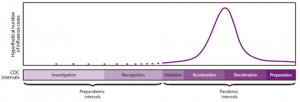Public health threatsU.S. needs greater preparation for next severe public health threats: Experts panel
In a report released last week by the U.S. Department of Health and Human Services (HHS), an Independent Panel formed to review HHS’s response to Ebola made several recommendations on how the nation’s federal public health system should strengthen its response to major public health threats, both internationally and domestically. “Without focused and sustained effort, the result of other novel public health threats could be much more devastating,” said the chairman of the Independent Panel.

Preparation and response to a hypothetical influenza outbreak // Source: flu.gov
In a report released last week by the U.S. Department of Health and Human Services (HHS), an Independent Panel formed to review HHS’s response to Ebola made several recommendations on how the nation’s federal public health system should strengthen its response to major public health threats, both internationally and domestically.
The report calls for increased coordination both within HHS and across all involved federal agencies. It also recommends strengthened coordination and collaboration with state and local governments and their private-sector partners. The panel’s recommendations emphasize the critical need for constant focus and ongoing funding for preparedness and response necessary to change systems and policy if the United Ststaes is to be sufficiently prepared for public health crises.
“More than 11,000 people lost their lives during the Ebola outbreak of 2014-2016. But without the unstinting commitment of many HHS employees and international partners who fought tirelessly to help affected West African nations identify and contain this epidemic, many more lives would have been lost and the risk of dissemination outside that region greatly increased. We are grateful for their bravery and sacrifice. Yet it’s critical that we better prepare our nation for the ever-looming threats to the health of our U.S. and global communities,” said Dr. Jonathan Fielding, Distinguished Professor at UCLA, who chaired the Independent Panel. “Without focused and sustained effort, the result of other novel public health threats could be much more devastating.”
UCLA notes that the Independent Panel, comprising public health, healthcare, emergency response, and communication experts, convened in July 2015 at the invitation of HHS Secretary Sylvia Mathews Burwell. Charged with capturing critical lessons learned from HHS’ response to Ebola, the panel’s review included a survey of over 1,100 HHS staff involved in the international and domestic response and interviews with more than 200 individuals representing local, state and federal agencies, including HHS, and key private and independent sector organizations involved in responding to Ebola. The panel also reviewed situation reports, leadership briefs and after-action reports from HHS and other federal agencies, and reconstructed a timeline of milestones and key activities throughout the response.
